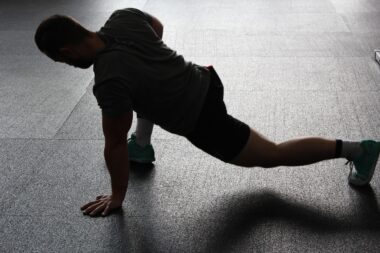Pre-Workout Nutrition and Its Role in Boxing Warm-Up Effectiveness
Nutrition plays an essential role in any athlete’s performance, especially in disciplines such as boxing where intensity and endurance are key. Pre-workout nutrition must not be overlooked when considering warm-up routines, as it directly influences energy levels, endurance, and overall performance. A proper nutritional strategy can help boxers increase their stamina and focus during training or fights. Focus on complex carbohydrates, proteins, and healthy fats to provide sustained energy without sudden spikes or drops in blood sugar levels. Leveraging energy-dense snacks such as bananas or energy bars can also prepare the body for an intense warm-up session. Hydration is another critical aspect that often gets neglected; drinking water before training helps maintain optimal physical and mental performance. Tuning your body for the upcoming exertion involves giving it the right fuel to fight fatigue effectively. Additionally, paying attention to micronutrients like vitamins and minerals can further enhance boxing performance. Each boxer might need different dietary adjustments, and understanding individual needs is crucial for success. Thus, pre-workout nutrition becomes a linchpin of effective boxing warm-ups and conditioning exercises.
Understanding the timing of nutritional intake can drastically improve the effectiveness of warm-up routines. Ideally, boxers should consume a balanced meal roughly 2-3 hours prior to training, which allows time for digestion and energy availability. This meal should comprise carbohydrates, lean proteins, and healthy fats. For those who have less time, like 30-60 minutes before a session, nutrient-dense snacks can help fill the gap. Simple carbohydrates such as fruits or yogurt are beneficial in this scenario. These quick-to-digest sources offer immediate energy, helping boxers harness peak performance during essential warm-ups. Sometimes, however, boxers might incorrectly assume that they can skip meals wholly, which is detrimental to their energy levels and cognitive functions. A well-rounded approach ensures that boxers feel revitalized, focused, and ready to engage fully in skills training. Furthermore, tracking performance post-nutrition adjustments can help athletes determine the best nutritional strategies. This approach not only aids the immediate workout but contributes to overall long-term nutritional habits and performance levels in the sport.
The Benefits of Proper Pre-Workout Nutrition
Proper pre-workout nutrition extends beyond just providing immediate energy; it contributes significantly to the body’s adaptability and recovery processes. Consuming essential amino acids before training can help repair muscle tissues that become strained during boxing workouts. In addition to building muscle, pre-workout nutrition can enhance the body’s power output, allowing fighters to train at higher intensities. Without an appropriate intake of nutrients, boxers may experience fatigue, delayed recovery, and reduced performance efficiency. Additionally, good nutrition also supports mental sharpness by ensuring that the brain gets the energy it needs to maintain focus during training and matches. Boxers benefit tremendously when they pair their warm-up routines with smart nutrition; this synergy creates a strong foundation for high-level performance. Nutrients absorb in different ways, depending on timing and composition, so careful consideration helps to maximize these benefits. Creating a meal and snack plan that complements the overall training regimen can make a real difference in performance outcomes for boxers. Sustaining energy throughout rigorous training schedules is vital for maintaining motivation and ongoing improvement in skills.
The significance of hydration in boxing cannot be overstressed. Inadequate fluid intake can lead to detrimental effects such as impaired coordination, reduced strength, and increased fatigue. All these factors can severely compromise the effectiveness of a boxer’s warm-up routine. Fluid loss from sweating can quickly diminish performance levels, making it paramount for athletes to develop hydration habits. Water serves to regulate body temperature, lubricate joints, and transport nutrients—essential functions during intense physical activity. As part of pre-training routines, boxers should focus on staying hydrated, ensuring their bodies are primed for action. Electrolytes often lost through sweat during rigorous workouts should also be replenished, particularly for fighters who train for longer sessions. Consuming beverages enriched with electrolytes or natural coconut water can provide this balance. Opting for a hydration strategy that matches individual needs further improves training effectiveness and reduces injury risk. Consistency in these habits fosters resilience in both training and competition settings, solidifying the importance of hydration in an optimal warm-up procedure.
Linking Nutrition with Performance
Linking pre-workout nutrition with performance can yield outstanding results for boxers dedicated to excellence. Nutrition should be viewed as a well-curated part of training regimens, involving both physical and mental preparation. By fueling the body with appropriate nutrients, athletes can improve their response to warm-up activities, executing techniques with greater precision and agility. Research supports the argument that well-nourished athletes often outperform those who neglect dietary considerations. Performance optimization occurs when energy levels are sustained throughout each training session, avoiding fatigue that hinders focus and reaction times. Furthermore, optimal nutrition should also include adjustments based on individual differences, such as metabolic rates or personal preferences. It allows boxers to tailor their nutritional intake to maximize their innate strengths and support recovery. Regular progress evaluations will guide boxers in refining their nutritional choices, ensuring they are always equipped for their best performance possible. Facilitating the right changes can lead to enhanced agility, strength, and robust mental clarity—all essential elements in boxing.
A successful warm-up routine not only requires proper nutritional strategies but also a holistic approach that integrates movement and activation techniques. A warm-up serves to elevate the heart rate and prepare muscles for exertion, making it vital that such routines are coupled with nutrition to support performance. Boxers can enhance their warm-up efficiency by practicing dynamic stretches and drills, alongside appropriate nutrition. These practices elevate core temperature, improve flexibility, and promote range of motion, all while ensuring that a well-fueled body efficiently engages in activities. Integrating sport-specific movements into warm-ups prepares the fighters’ bodies for skills and strategies during actual matches. This interconnectedness ensures that boxers stand ready and capable when it’s time to perform. Remembering to listen to one’s body also supports wellness, as it can help identify areas requiring extra focus or care. Therefore, a complete warm-up regimen comprises nutrition, dynamic movements, and mindfulness, solidifying routine effectiveness and enhancing fighters’ performance levels.
Conclusion: Optimizing Boxing Warm-Ups
Ultimately, optimizing boxing warm-ups hinges on the balance between nutrition, movement, and psychological readiness. Each component significantly contributes to performance outcomes, making it vital for athletes to invest time in developing efficient pre-workout plans. The synergy created by effective nutrition enhances responsiveness and focus during training sessions, laying the groundwork for advanced skills and techniques. Additionally, remaining hydrated and attentive to micronutrient needs transforms traditional warm-up routines into comprehensive preparation strategies. Boxers equipped with personalized nutrition plans can experience better energy levels, a reduction in injury chances, and enhanced overall performance capabilities. As athletes continue to push boundaries in their training, these elements not only elevate individuals but improve the sport’s standards. Recognizing that pre-workout nutrition is foundational creates opportunities for boxers to shine in their discipline. Further exploration into the nutrition-performance connection continues to unfold, leading to more breakthroughs in effective practices. By prioritizing these principles, boxers can ensure that they successfully navigate the challenges ahead, performing at peak capacity and achieving their long-term goals.
Create a plan focused on nutrition that adapts to your training needs, prioritizing both quality and timing. This allows for regular evaluations and modifications to ensure you always aim for excellence. Fostering a culture of discipline in boxing includes not only training but also complementary aspects like nutrition. An attentiveness toward pre-workout nutrition can unlock potent benefits, setting the stage for future success. Moreover, developing a sustainable approach to nutrition can cultivate lifelong healthy habits that reach far beyond the ring.





